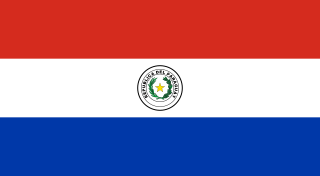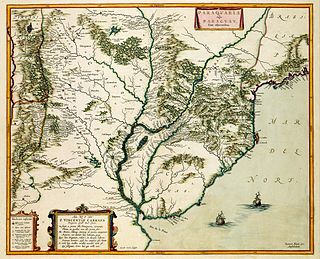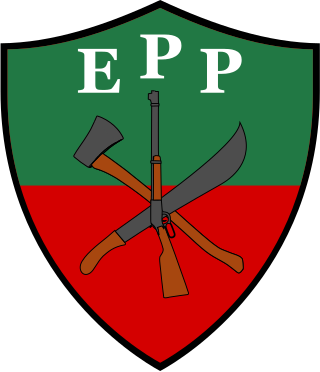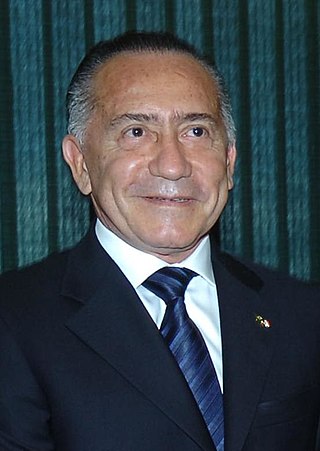
Paraguay, officially the Republic of Paraguay, is a landlocked country in South America. It is bordered by Argentina to the south and southwest, Brazil to the east and northeast, and Bolivia to the northwest. It has a population of around 6.1 million, nearly 2.3 million of whom live in the capital and largest city of Asunción, and its surrounding metro area.

The history of Paraguay encompasses thousands of years of human habitation. Both agricultural and nomadic Guaycuruan lived in the region at the time of the Spanish Conquest. It became a relatively neglected part of the Spanish Empire due to its isolation and lack of mineral wealth, nonetheless a small group of Spanish settlers came to reside in the area, increasingly intermarrying with native women to produce a mestizo population. In the 17th and 18th centuries, Jesuit missionaries organized the natives into planned communities known as reducciones, and the experiment gained notable attention in Enlightenment Era Europe.

Alfredo Stroessner Matiauda was a Paraguayan army officer, politician, and dictator who served as President of Paraguay from 15 August 1954 until his overthrow from power on 3 February 1989. His rule is commonly referred inside Paraguay as El Stronato.

Óscar Nicanor Duarte Frutos is a Paraguayan lawyer, journalist and politician who served as the 47th President of Paraguay from 2003 to 2008. A member of the Colorado Party, he became the central figure of Paraguayan politics during his presidency.

The National Republican Association, also known as the Colorado Party, is a conservative political party in Paraguay, founded on 11 September 1887 by Bernardino Caballero. Since 1947, the colorados, as they are known, has been dominant in Paraguayan politics and has controlled the presidency since 1948 –notwithstanding a brief interruption between 2008 and 2013– as well as having a majority in both chambers of Congress and department governorships.
This article gives an overview of liberalism and radicalism in Paraguay. It is limited to liberal and radical parties with substantial support, mainly proved by having had a representation in parliament. The sign ⇒ means a reference to another party in that scheme. For inclusion in this scheme it isn't necessary so that parties labeled themselves as a liberal party.

Oriental Revolutionary Movement is a far-left Marxist–Leninist communist party in Uruguay.

The Revolutionary Party of the Nationalist Left was a left-wing political party in Bolivia. It was founded in 1963 by the labor leader Juan Lechín Oquendo and by Mario Torres Calleja and Edwin Moller in lesser roles. The PRIN seceded from the Revolutionary Nationalist Movement (MNR) in protest against Víctor Paz Estenssoro's decision to seek a third elected term as president in 1964, rather than permit then Vice-President Juan Lechín to have the MNR's presidential nomination.
The Christian Democrat Organization of America is an international organization made up of political parties, groups, and associations in North America and South America that promote the principles of Christian humanism. Affiliated with the Center Democratic International, it is a regional partner of the European People's Party and regional organizations of Christian Democratic parties in Asia and Africa.

Fernando Armindo Lugo Méndez is a Paraguayan politician and laicized Catholic bishop who was President of Paraguay from 2008 to 2012. Previously, he was a Roman Catholic priest and bishop, serving as Bishop of the Diocese of San Pedro from 1994 to 2005. He was elected as president in 2008, an election that ended 61 years of rule by the Colorado Party.

Women in Paraguay face challenges to their rights. Faced by socioeconomic inequalities and gender pay gap, they experienced significant cultural changes since 1990 as a result of constitutional and legal expansions of women's rights and evolving cultural attitudes. The legal and government institutions currently existing in Paraguay were developed in part through the efforts of feminist organizations in the country that held significant awareness-raising campaigns during the 1990s to formalize the guarantees of women's rights. UN Women supports the Paraguayan State in the challenge to extend women's rights, to fight for gender equality, as well as women's empowerment. It also ensures that women's voices are heard and create more opportunities for women.

The Paraguayan People's Army is a Marxist-Leninist guerrilla group that officially operates in Paraguay since March 1, 2008, although its antecedents go back as far as the 1990s, acting at that time as the "clandestine armed wing" of Patria Libre.

The Guasú Front is a democratic socialist electoral alliance in Paraguay for the general election in 2013. It was formed in 2010 by a merger of the centre-left Patriotic Alliance for Change and the left-wing Unitary Space – People's Congress. It consists of eleven parties, including the Party for a Country of Solidarity, the Tekojoja People's Party. It is led by impeached former president Fernando Lugo, who also ran as a senatorial candidate. Its presidential candidate was Aníbal Carrillo.

The dictatorship of Alfredo Stroessner, colloquially known as the Stronismo or Stronato, was the period of almost 35 years in the history of Paraguay in which army general Alfredo Stroessner ruled the country as a de facto one-party state under an authoritarian military dictatorship, from 15 August 1954 to 3 February 1989.

On 31 March 2017, a series of protests began in Paraguay, during which demonstrators set fire to the Congress building. The demonstrations occurred in response to a constitutional amendment that would permit President Horacio Cartes to run for re-election, a move described by the opposition as "a coup". One protester was killed in Paraguay's capital, Asunción, after being hit by a shotgun blast by police. Several protesters, politicians and journalists, as well as police, were reported injured, including one lower-house deputy who had to undergo surgery after being injured by rubber bullets. On 17 April, President Cartes announced that he was resigning from any possible candidacy for a second presidential term. On 26 April, the Chamber of Deputies of Paraguay rejected the proposed constitutional amendment for presidential re-election.

Lilian Graciela Samaniego González is a Paraguayan pharmaceutical chemist and politician of the Colorado Party. She has been a member of the Senate of Paraguay since 2004.

The 1996 Paraguayan coup d'état attempt was an attempted coup d'état in Paraguay that took place between 22 April and 25 April 1996 with the purpose of deposing then President of Paraguay Juan Carlos Wasmosy. The attempted coup was undertaken by then Army General Lino Oviedo, who declared himself in rebellion against the president for forcing Oviedo into retirement. The attempted coup caused a serious political crisis that would last for three days, being the first serious crisis to occur after the fall of Alfredo Stroessner's dictatorship in the 1989 Paraguayan coup d'état, and its consequences would extend at least until the beginning of the following decade.

The 2000 Paraguayan coup d'état attempt was a political crisis that occurred in Paraguay in May 2000, with the aim of deposing then President of Paraguay Luis Ángel González Macchi and arresting some "anti-oviedista" members of Congress. The attempted coup was led by a group that called itself "Fulgencio Yegros Patriotic Movement", formed by at least fifty soldiers, most of them retired and loyal to former General Lino Oviedo, who at the time was in political exile.















